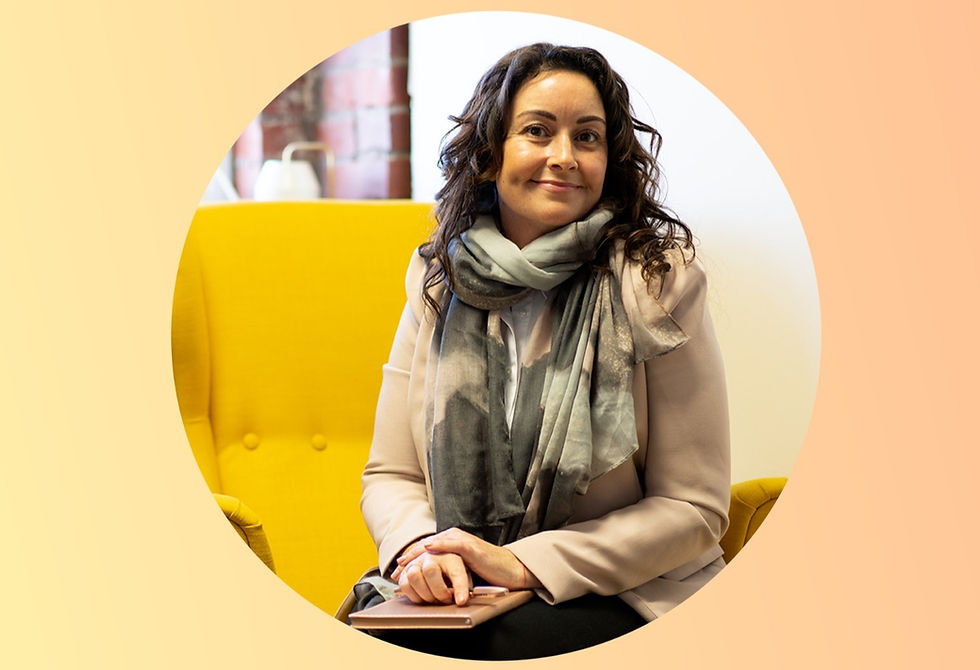Bitbaby - A Safe Way for Women to Monitor Their Unborn Baby at Home
- Caroline Louise

- Apr 24, 2023
- 3 min read
Updated: Mar 22, 2024
A midwife of 20 years is developing a wearable, at-home device for pregnant women to consistently monitor their unborn baby’s movements through their phone.
Rachael Curran started developing Bitbaby in 2019, a fabric band that fits around a pregnant tummy with non invasive, highly attuned, sensors that monitor a baby’s movements and display them through an app on your phone in real-time. Rachael has been a midwife for 20 years both in the NHS and Private Midwife Led Care and it’s her experience which inspired Bitbaby. “I have always wanted to help make a difference and ensure that the care of mothers and babies is of the highest standards”, Rachael said. “My ambition remains to ensure women feel heard, safe and truly cared for at a time when they can feel most vulnerable.”

Rachael explained that movement is one of the most important indicators of a baby’s well-being and development also that problems in movement can lead to poor outcomes and stillbirths. But, throughout her career she has found that women are finding it difficult to understand their baby’s movements and patterns. “Mothers express that they feel a huge sense of responsibility and don’t always know what they should be checking for”, Rachael said. “Women have expressed to us that this is leading to increased anxiety and if they do notice a change or reduction in movements, they’re unsure and not feeling confident, leading to delays in seeking advice.”

Pregnant women have currently been using dopplers, a sound wave device, at home with hopes to detect their baby’s heartbeat. However, in 2017, Kicks Count charity launched their ‘Ditch the Doppler’ campaign to regulate or ban the sale of home dopplers to expectant parents.
Kicks Count CEO Elizabeth Hutton explained that a doppler can pick up the sound of a mother’s heartbeat or the placenta pulsing or the mother’s main artery all which could be mistaken for a baby’s heartbeat. “Just for arguments sake, Let’s say these home dopplers pick up the heartbeat perfectly and the mum can pick it out flawlessly, what does that tell us? Absolutely nothing” Hutton explains. “The best indicator of fetal wellbeing is always the baby’s movements and this is what we should be focusing on.”
Rachael was influenced by this campaign and wanted to give pregnant women something safe and medically accurate to check on their baby’s wellbeing at home. But, it wasn’t until Fitbit’s new development of sleep cycles that she began to understand how that could be done. “I thought to myself, well if sensors can detect when someone is awake and then asleep, this is the pattern an unborn baby follows in the womb”, she explained. “When they’re awake they are active and when they have regular sleep periods they are not active. Would there be some way to detect their behaviour using sensors on the mothers abdomen?”

She approached NOVA in Liverpool and attended a “start up school” to prepare and pitch and business plan. NOVA became Rachael’s co-founder and with them she developed the first prototype and conducted early studies.
Bitbaby has now built a user guidance panel of over 350 mothers, along with a network of obstetricians, midwives and researchers to support development. They have conducted trials with the prototype on 23 pregnant women in concurrence with ultrasound scans and are now conducting clinical trials with Tommy’s Research Centre, St Mary’s NHS Trust and University of Manchester.
In 2021, Statista recorded 2,866 still births in the UK which was 288 more than in the previous year. The UK government have now set a national ambition to halve the rate of still births from 5.1 per 1,000 births in 2010 to 2.5 in 2025. Rachael hopes Bitbaby can give pregnant women the support they need and help to reduce that number.
“Our aim is that with Bitbaby, a mother will feel less anxious during their pregnancy”, she said. “By providing information, guidance and support throughout all aspects of pregnancy my hope is that through Bitbaby mothers will feel empowered to ask questions and be more involved with decisions in regard to their care.”
Rachael hopes to fully launch Bitbaby in 2024.










Comments